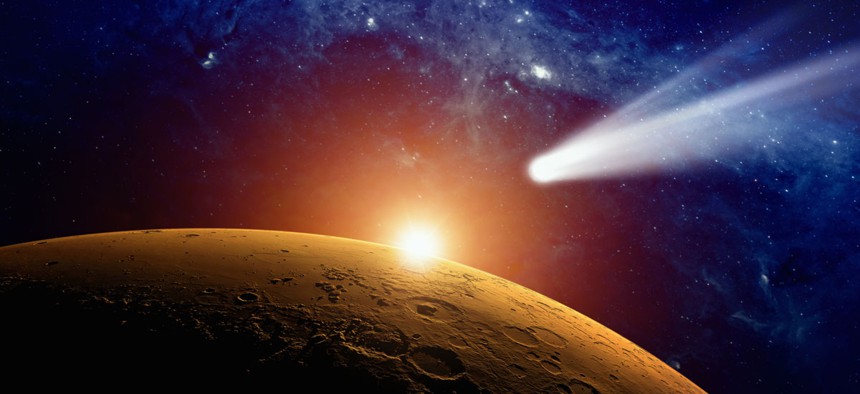US Has Space Experts Worried About an Extraterrestrial Land Grab

Igor Zh./Shutterstock.com
Plans to make money in space are missing one of the fundamental ingredients to any business: property rights.
Plans to make money in space are missing one of the fundamental ingredients to any business: property rights.
If you go mine an asteroid, as several companies plan to do, and bring some minerals back to earth, can you sell them? If you build a moonbase, as entrepreneur Robert Bigelow is contemplating, and someone else wants to land a rocket there, what’s to stop them?
Asteroid miners eager to raise funds to raid space rocks—some of which are packed with minerals valued in the trillions of dollars—are faced with a legal code that was never meant to apply to private enterprise in space, since it was written well before it took anything less than the resources of a national government to get to orbit.
The 1967 Outer Space Treaty, for example, was designed largely to keep nuclear weapons out of orbit at the height of the Cold War and deter a potential “colonial competition” in outer space. When it comes to property, it simply says that nations cannot claim sovereign territory in space, and that they are responsible for any space activities by their nationals.
The last time the world attempted to re-write space law, with the Moon Treaty of the 1970s, the negotiators came up with a document that banned private property and sovereign claims on celestial bodies. But no country that could put people in space signed on. (Eleven non-space-faring countries did, though.)
Now, with private companies routinely re-supplying the International Space Station and vying to put a manned mission in orbit by the end of 2018, there’s a clamoring for clarity—especially among asteroid companies, which have been pressuring the US Congress for help.
This week the House of Representatives took a step forward, passing a commercial space bill designed to clear a path for these businesses. Among other things, it would delay any airline-style regulation of space tourism until at least 2025, provide liability protection for some launches, and streamline permitting processes.
If enacted, it also would create new commercial property rights in space that have some space lawyers—yep, they exist, in small quantities—worried about a major backlash.
The legislation recognizes two specific kinds of property rights, both arguably within the rules of the 1967 Outer Space Treaty: First, if you can obtain a resource, it’s yours—akin to the moon rocks brought back by astronauts or meteorites you can buy on E-Bay. Second, if you’re doing something in space, someone can’t just come and interfere with what you’re up to.
“What the bill tries to do is say that the US will recognize claims of property rights of US citizens who go out and mine asteroids,” space lawyer James Dunstan explains. “That’s the goal, to say, if you expend the resources and go do it, and bring that stuff back, we will agree—recognize it—as your property.”
But he and others fear that because the bill doesn’t contemplate a method to resolve competing claims from representatives of different nations, it could spur a new, ugly space race based on territory grabs—or set back efforts for property rights.
“If the US approaches this in a way that seems like cowboy imperialism, you could either revive interest in the Moon Treaty,”—which, reminder, bans private property in space—”or just spur a very narrow reading of the outer space treaty,” says Berin Szoka, head of the libertarian technology policy think tank TechFreedom. “Either case could end up setting the cause of private property rights back significantly.”
Both Szoka and Dunstan support property rights in space but say the bill needs modification before it goes forward.

They argue that the rushed process to write this bill—there wasn’t even a public hearing about it—could lead to unexpected and detrimental precedents. For instance, this bill is limited to asteroids, but that might not stop other countries from leveraging it with other celestial bodies, like the moon.
“China could apply that precedent. ‘We’ll pass our own law for all space resources,’ China might say, something like the 200-km [exclusive economic zone] that Bigelow has been asking for,” Szoka says. “If you took it to that extreme, China could land first on the pole of the moon and claim non-interference rights for the entire pole—all of the polar ice.”
The potential for scenarios like these, Dunstan says, could lead US president Barack Obama’s diplomatic and national security advisers to recommend that he veto this bill, should it reach his desk. Both Dunstan and Szoka are hopeful that when the Senate considers its version of the bill, it will ask the White House to propose an international settlement mechanism akin to what is used to recognize deep seabed mining claims without claiming national sovereignty.
Otherwise, they fear that space businesses beyond tourism may be dead in the water.
“Private companies can be a spur—this would not be happening if there weren’t two real companies behind it—but they are not going out and doing it and hoping the law catches up,” Dunstan says. “They are pushing Congress to act so they know they are protected.”
(Image via Igor Zh./ Shutterstock.com)






